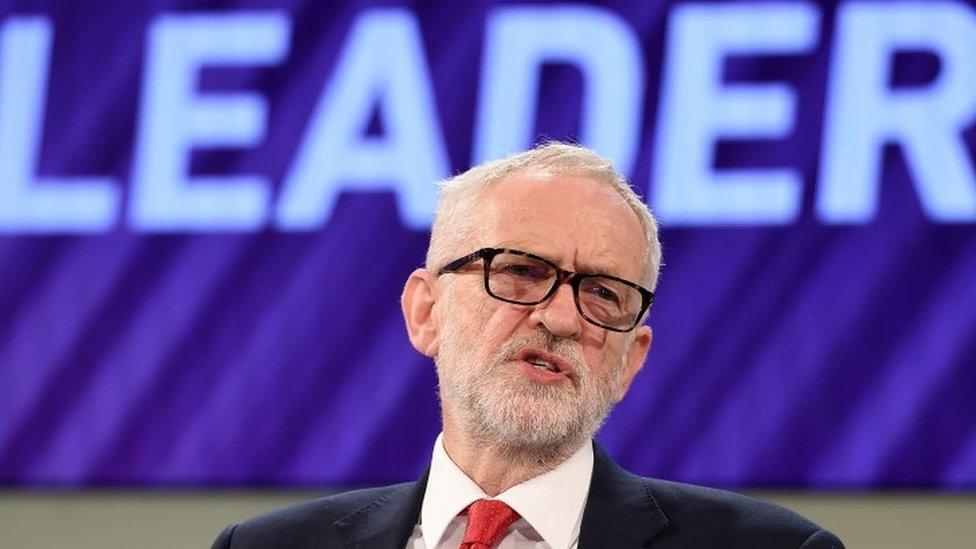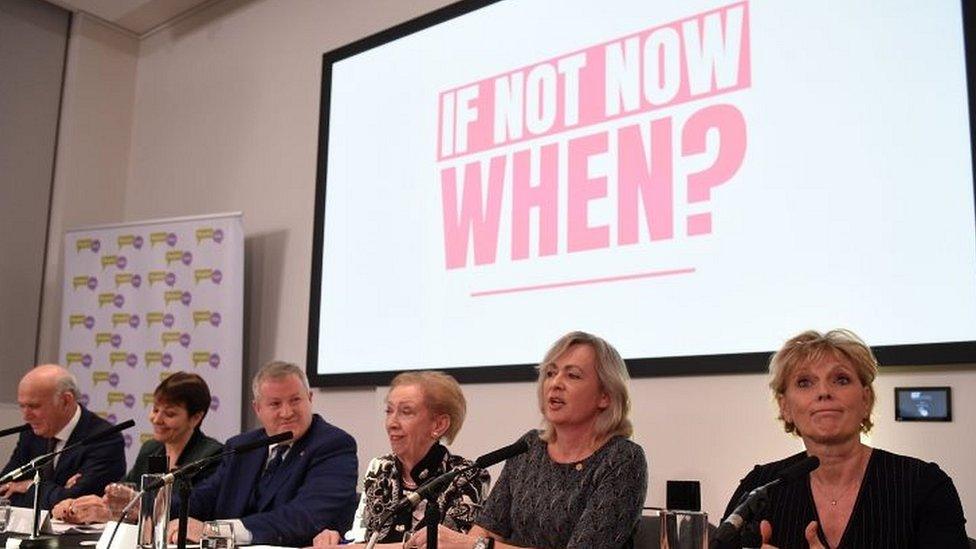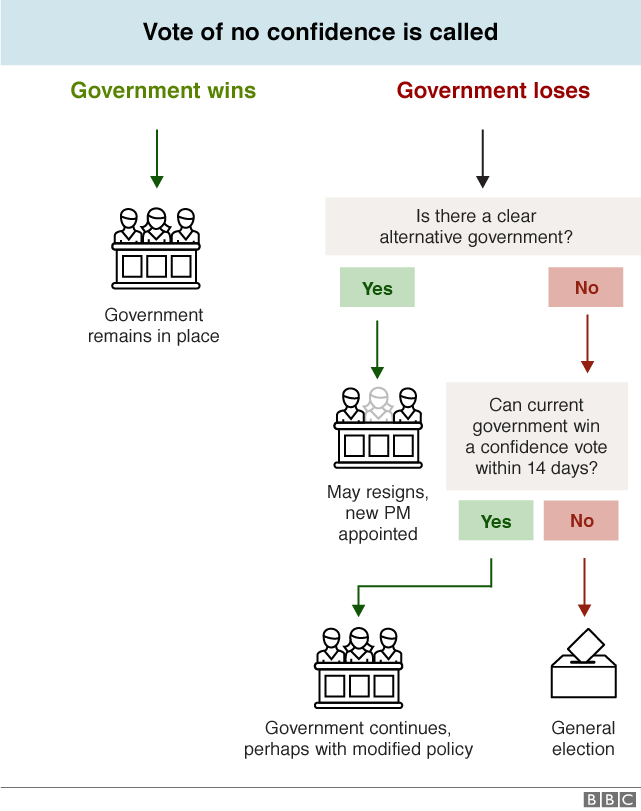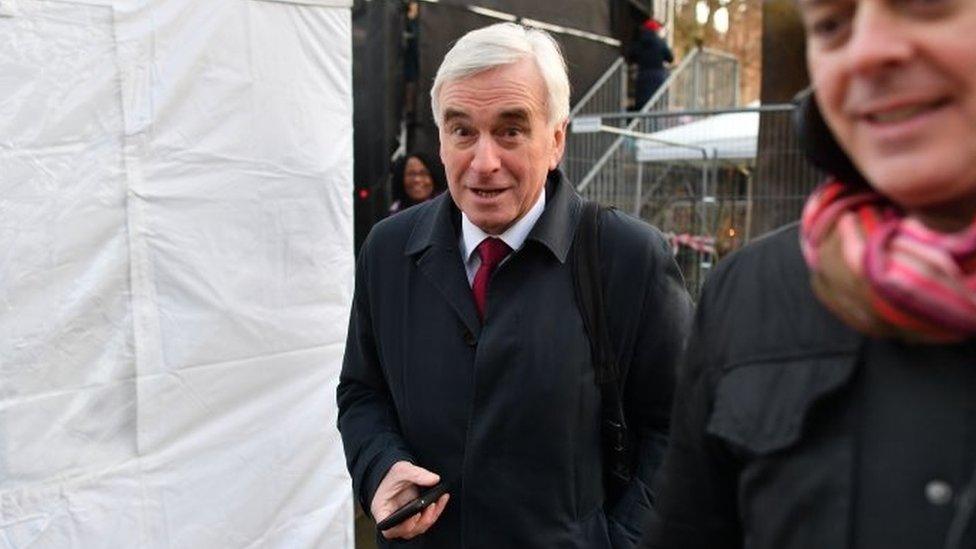Why is Jeremy Corbyn not trying to topple Theresa May right now?
- Published

With Theresa May on the ropes, Jeremy Corbyn is coming under pressure from other opposition parties - and some of his own MPs - to finish her off with the knockout blow of a no-confidence vote in the House of Commons.
Unlike the vote she has just survived this would give all 650 MPs - not just 317 Conservatives - a say over whether she should remain in power.
A no-confidence vote - won by a single vote - was how Margaret Thatcher removed Labour from power in 1979, triggering a general election that she won.
The rules have changed since then. Under the Fixed Term Parliaments Act, if a majority of MPs backed a no-confidence motion, it would start a countdown which would lead to an early election, if no successor government was able to win a vote of confidence within 14 days.
The Labour leadership's main aim has always been to force an election, which it believes Mr Corbyn will win.
So what are they waiting for?
"We're fully prepared to bring a no-confidence vote when we know we can win," said Labour chairman Ian Lavery in a video message on Facebook, external, but, he added, doing so too soon would "serve only to strengthen Theresa May".
Why would a no-confidence be likely to fail now?
The Democratic Unionist Party, whose 10 MPs the Tories rely on for a majority, have promised to support the government in a confidence motion.
They want to give her time to seek changes to her EU withdrawal deal.
But their support is not tied to Mrs May personally and they would not back her if she sought to press ahead with her deal without ditching the Northern Ireland "backstop" clause, which they object to.
So why the clamour for one as soon as possible?

The People's Vote campaign is urging Jeremy Corbyn to back a referendum
Mr Corbyn has been accused of "cowardice" and of failing to provide proper opposition by the SNP, the Lib Dems and others, for apparently sitting on the sidelines as the Conservative Party tears itself to pieces over Brexit.
But Unite general secretary Len McCluskey, a key ally of Mr Corbyn, has warned that the Labour leader should not be "bounced" into holding a no-confidence vote by "those who have little or no interest in seeing Labour elected".
Mr Corbyn has said he has no confidence in the government but will wait for an "appropriate" time to strike.
Those pushing for a no-confidence vote as soon as possible are mostly advocates of a further EU referendum - and their best, possibly their only, hope of getting one is if Labour gets behind it.
They include the SNP, the Lib Dems, Plaid Cymru, the Green Party, a small group of Conservatives and MPs from Labour's pro-EU "moderate" wing like Chuka Umunna and Margaret Beckett, who are not natural allies of Mr Corbyn.
Labour's shadow Brexit secretary Sir Keir Starmer and deputy leader Tom Watson are also reported to be in the "just get on with it" camp, external.
Mr Corbyn bowed to pressure from his own party members at this year's Labour conference - the majority of whom, polls suggest, want another referendum.
The party leadership said it would consider supporting another referendum if it fails in its bid to get a general election.
So the strategy of those pushing Mr Corbyn for a no-confidence vote depends, to some extent, on that vote failing.
Why don't the SNP and the others table their own no-confidence vote?
They are threatening to do this - but it would be largely symbolic, without Labour's backing.
Any MP can table a motion of no confidence but it is unlikely to be given Parliamentary time without the support of a major party - and it would stand very little chance of success without the backing of the main opposition party.
When could a no-confidence vote be held?
Some are arguing for a vote next Monday, when Mrs May makes a statement to the Commons on Thursday's EU summit.
But it is more likely to be in the New Year when MPs finally get a vote on Mrs May's deal with the EU, which she is widely expected to lose.
Some in the pro-referendum camp fear this will be too late to get a referendum together.
And some - such as Plaid Cymru MP Liz Saville Roberts - have suggested this would suit Mr Corbyn, who, she said, might be "comfortable" with a no-deal Brexit.



What is the Labour leadership's position on a no-deal Brexit?

John McDonnell: No majority for a no-deal Brexit
They are adamant that this is the last thing they want. They say they want to win an election and then delay Brexit so they can go to Brussels and get a better deal that would see the UK being part of a customs union with the EU.
Shadow Chancellor John McDonnell has said Labour is ready to work with Theresa May on alternatives to prevent a no-deal Brexit.
"The easiest thing for any opposition to do in these circumstances is to warm your hands as the Conservatives self-immolate," he told BBC Radio 4's Today programme.
"But you can't do that, not when the issues are so big for the future of the country."
He urged the prime minister to hold a series of votes in Parliament on different scenarios, including no-deal, to establish what MPs were willing to accept.
"I think there's an overwhelming majority in the House of Commons against no-deal," he said.
"Let's establish that once and for all and use parliamentary mechanisms to narrow that option away. Then let's get a proper debate going."